When It Comes to Wolves, It's the Habitat, Stupid
Leaders with the Montana Wildlife Federation argue increasing habitat functionality is the conservative, financially smart way to boost game herds where needed. By Skip Kowalski and Tim Aldrich, Montana Wildlife Federation, Guest Writer, 7-30-10
| | |
 |
| | . |
 |
We originally set out to write a piece about wolves and how hunters can manage all wildlife, even large carnivores, under the North American Model of Fish and Wildlife Conservation. We quickly realized that this topic has been "rode hard and put away wet" so to speak. What we discovered, through our own reflection, is that there seems to be an important lesson learned and not being adequately applied by those who hunt – the lesson of the importance of habitat. Yes, elk are significantly reduced in some areas, and, yes, wolves are a factor in that decline. We've all read or heard about it. It's not news. We must remember that in reality, predators are just one part of the big game ecology equation.
Habitat: Big, unbroken, secure chunks of Montana that are interspersed with working landscapes of ranches and farms; the parts of Montana that are relatively free of development. That's what drive wildlife populations. Without those big blocks of open country, we might as well just throw in the towel.
Whether it's noxious weeds, loss of winter habitat due to fragmentation, or the loss of access that helps disperse wildlife across our public lands, it's the habitat, stupid, as the saying goes. Wolves are a being used as the scapegoat for the greater ills that elk and deer face. Combine the loss of forage and cover, the loss of habitat diversity with a reduction in habitat security and then, the reality of too many teeth (canine and human) at the table sets in.
Luckily, Montana has some big, wild country left. Sportsmen have played a major role in protecting many of these places in Montana over the years, but we still need to conserve more of these few, remaining areas to offset the continued loss of habitat to development elsewhere. That's why we worked with the Coalition to Protect the Rocky Mountain Front to develop the Rocky Mountain Front Heritage Act.
Habitat conservation means intact and properly functioning ecosystems. To us, it means new Wilderness where appropriate; specially tailored management areas like the Conservation Management Area in the Rocky Mountain Front Heritage Act and fighting to make sure our native plant communities have the ability to withstand the onslaught of noxious weeds.
Elimination of predators over habitat conservation is a placebo. In almost every instance where it's been tried, it becomes clear the continual application of expensive predator control measures does little to provide sustainable healthy wildlife populations as opposed to protecting or restoring habitat. Focusing on a single factor rather than the whole cure is a fiscally irresponsible way of spending of our wildlife dollars. Increasing habitat functionality is the conservative, financially prudent way to increase game herds where needed.
For over 100 years, hunters and anglers, have backed habitat conservation through the designation of a series of Game Preserves, establishment of National Forests and National Parks, advocated for the 1964 Wilderness Act, supported Roadless Conservation, all while pouring billions of their own dollars in to state Wildlife Management Areas, Conservation Easements on private land, and through license sales and the excise taxes on new sporting equipment which have helped fund state wildlife management programs. Hunters and anglers support full funding of the Land and Water Conservation Fund, advocated for the Missouri River Breaks National Monument (try and tell us that the breaks aren't a crown jewel when it comes to hunting) and today, we actively and aggressively support other critical landscape conservation efforts. The Rocky Mountain Front Heritage Act is a prime example.
It's the habitat, clearly. The Front is a perfect example of a high quality, functioning ecosystem. Elk herds remain healthy, with quite a few B tags being issued to harvest surplus critters. It supports the full suite of predators that existed during the days of the Lewis and Clark expedition. Grizzly bears, wolves and mountain lions are all abundant. In fact, over 10% of the wolf harvest from last year came from the Rocky Mountain Front alone. This wild, unbroken country supports the second largest migratory elk herd in the United States. Some of the biggest mule deer left in Montana come from areas that should be, and hopefully will someday be, designated Wilderness. It's here, along these limestone reefs, that hunters have for over 100 years stood and said, just as Theodore Roosevelt once said; "Leave it as it is. The ages have been at work on it and man can only mar it."
This wildlife factory, the Rocky Mountain Front, has local stewards who have been fighting to preserve the Front for years. They fight to maintain their way of life. They cooperatively fight noxious weeds with their neighbors, their county governments, the Forest Service, Fish, Wildlife and Parks and many, many others.
They have done much, but we need to enlist others to support efforts to maintain the integrity and ecological value of places like the Front. Shouldn't the public, the ones who own the National Forest and BLM lands, share in the responsibility and demonstrate a solid conservation ethic like that of the private landowners? These landowners have collectively conserved 100,000 acres of their own land along the Front. If they see the value in wild landscapes, surely those of us who rely on this same country for our hunting, angling and soul soothing can do the same.
Hunters, watch the wolf, but fight to ensure your kids and their kids can, like you and your father, hunt in that same big sky country. Support the efforts to sustain our wildlife herds and conserve these slowly shrinking and irreplaceable habitats aggressively, whether it's the Front, the Yaak or the Blackfoot. It's not just your heritage to sustain or lose, it's everyone's. Now is the time for hunters to reclaim that golden age, when we stood together and worked towards the conservation of wildlife, not just those species for which we hunt and fish, but for all living creatures.
Skip Kowalski is chairman of the Wildlife and Wildlife Habitat Committee and Tim Aldrich is president of the Montana Wildlife Federation.
 to step up and permanently protect our part of this remarkable ecosystem that Alberta and Montana have recognized for a long time."
to step up and permanently protect our part of this remarkable ecosystem that Alberta and Montana have recognized for a long time." 


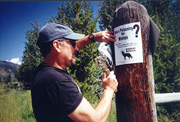

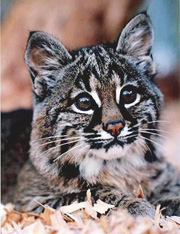
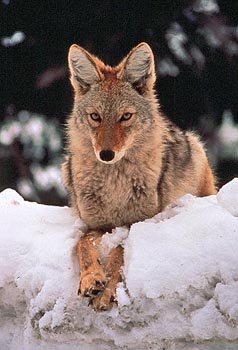
 Representatives DeFazio (OR) and Campbell (CA) have introduced H.R. 5643: the Compound 1080 and Sodium Cyanide Elimination Act. This federal bill would effectively ban two deadly poisons — sodium fluoroacetate (commonly known as Compound 1080 and used in the "Livestock Protection Collars" strapped on the necks of sheep or goats that spill the poison when punctured) and sodium cyanide (commonly used in M-44 "coyote-getter" baited poison ejector devices) — which are used primarily by the U.S. Department of Agriculture's Wildlife Services program to kill coyotes, foxes, and other wild animals perceived as threats to livestock. In 2008, these two poisons killed nearly 13,000 animals, and persisted in sensitive habitats poisoning our environment.
Representatives DeFazio (OR) and Campbell (CA) have introduced H.R. 5643: the Compound 1080 and Sodium Cyanide Elimination Act. This federal bill would effectively ban two deadly poisons — sodium fluoroacetate (commonly known as Compound 1080 and used in the "Livestock Protection Collars" strapped on the necks of sheep or goats that spill the poison when punctured) and sodium cyanide (commonly used in M-44 "coyote-getter" baited poison ejector devices) — which are used primarily by the U.S. Department of Agriculture's Wildlife Services program to kill coyotes, foxes, and other wild animals perceived as threats to livestock. In 2008, these two poisons killed nearly 13,000 animals, and persisted in sensitive habitats poisoning our environment. 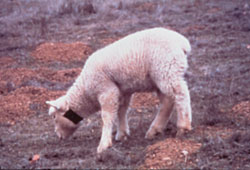 Banned by previous administrations (and then later re-legalized as a result of pressure from agricultural and livestock interest groups), these poisons have been condemned as cruel, indiscriminate, and dangerous. Non-target victims include domestic dogs, gray wolves, federally protected birds of prey, and even humans.
Banned by previous administrations (and then later re-legalized as a result of pressure from agricultural and livestock interest groups), these poisons have been condemned as cruel, indiscriminate, and dangerous. Non-target victims include domestic dogs, gray wolves, federally protected birds of prey, and even humans. 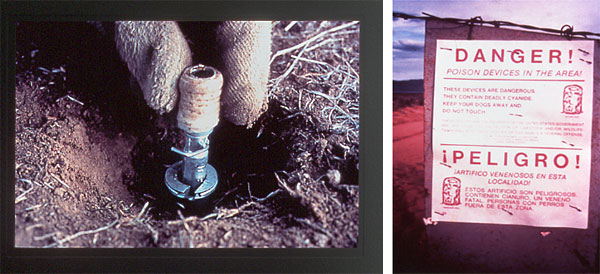
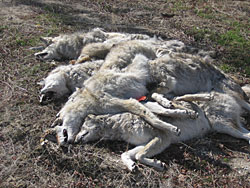 If you feel your Representative is not receptive to wildlife issues, consider that after 9/11 the FBI listed sodium fluoroacetate as "a highly toxic pesticide judged most likely to be used by terrorists or for malicious intent." According to the FBI, the main criteria for a poison being added to the list are "high dermal or inhalation toxicity, common malicious use reported, and prior use by terrorists." The FBI, the EPA, and the World Health Organization classify Compound 1080 as an "extremely hazardous toxic pesticide."
If you feel your Representative is not receptive to wildlife issues, consider that after 9/11 the FBI listed sodium fluoroacetate as "a highly toxic pesticide judged most likely to be used by terrorists or for malicious intent." According to the FBI, the main criteria for a poison being added to the list are "high dermal or inhalation toxicity, common malicious use reported, and prior use by terrorists." The FBI, the EPA, and the World Health Organization classify Compound 1080 as an "extremely hazardous toxic pesticide."



